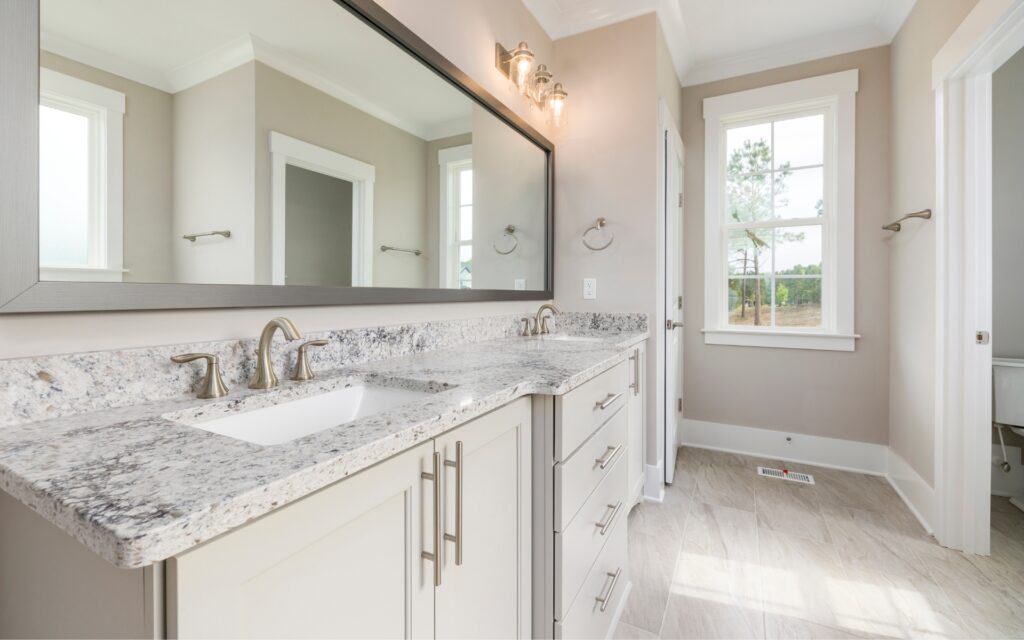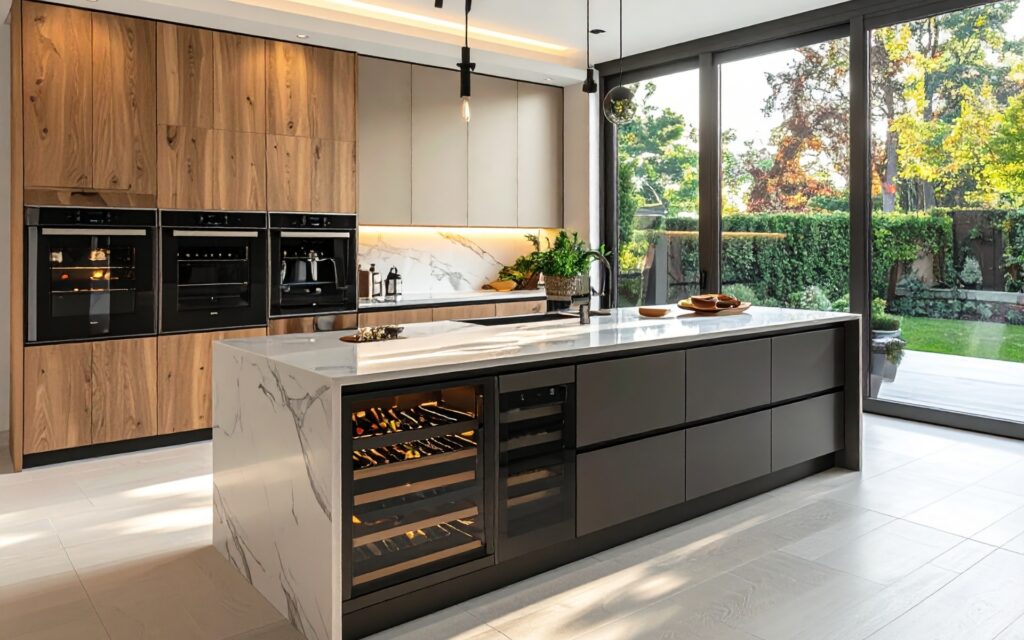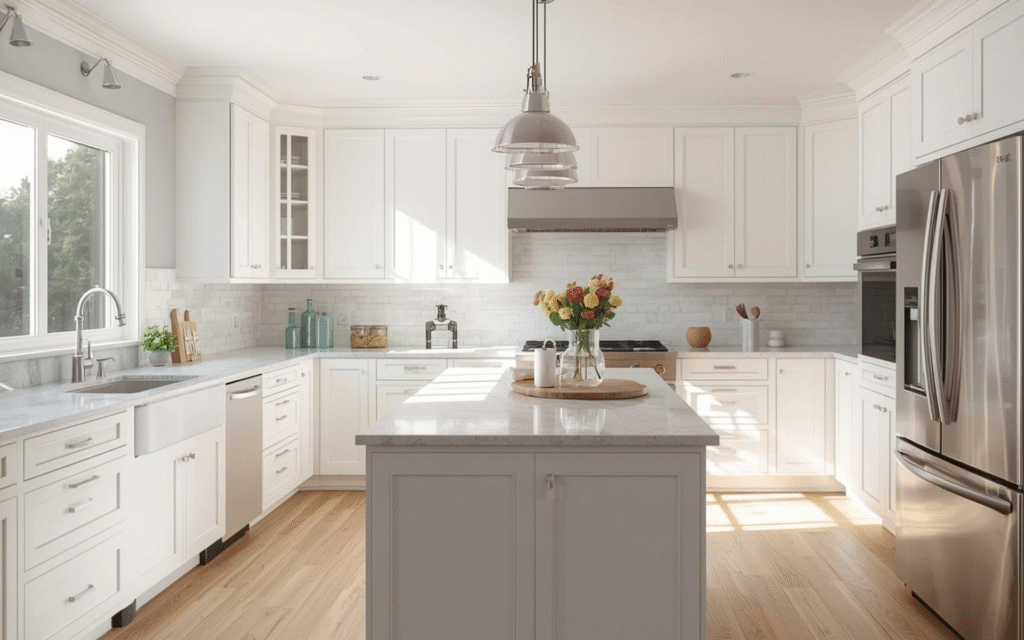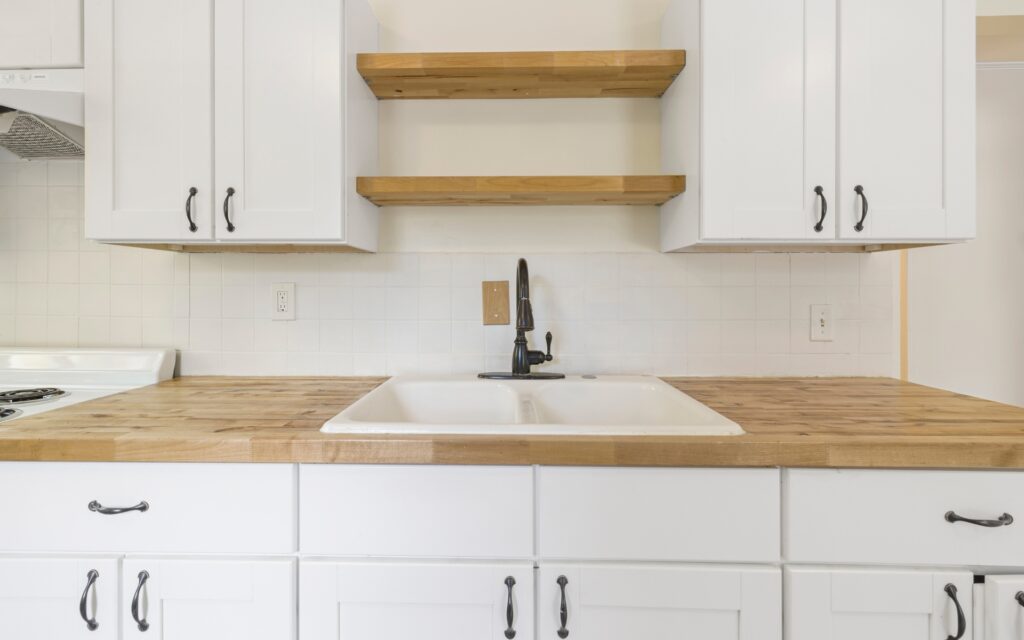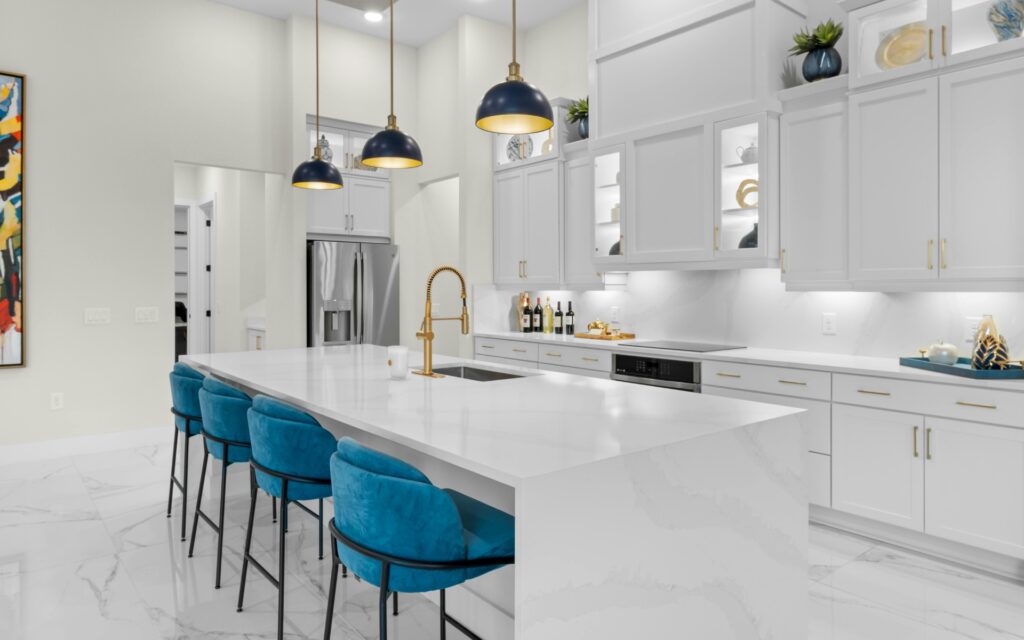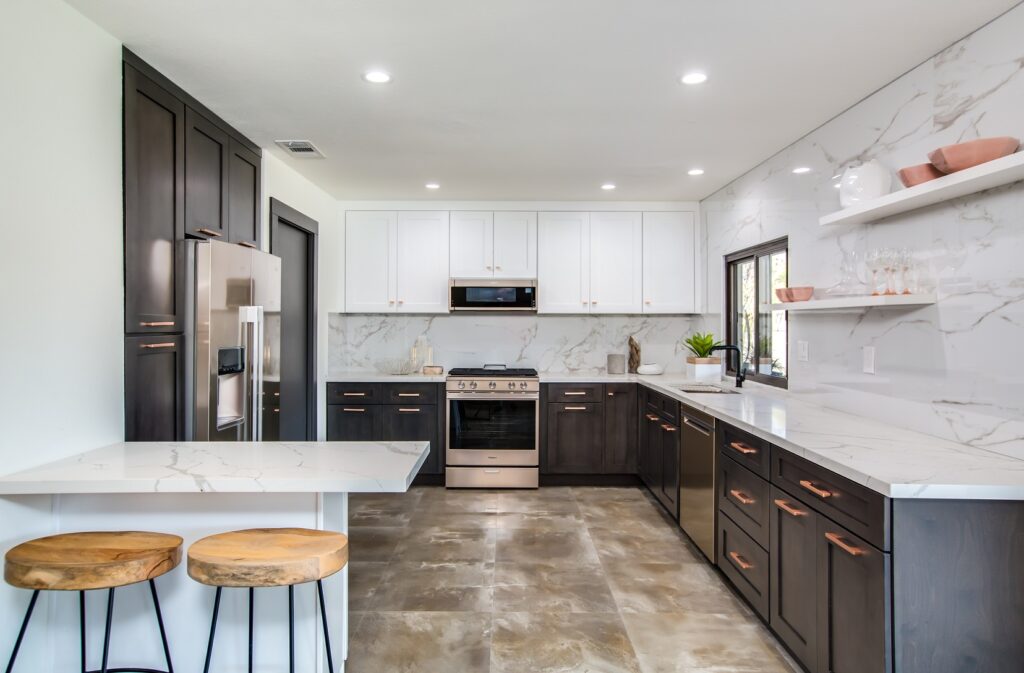Choosing materials for bathroom countertops shouldn’t feel like you need a geology degree. You want something that looks great, handles daily life, and won’t break your budget or your back trying to maintain it. After helping countless homeowners through bathroom renovations, we’ve seen which materials actually deliver on their promises and which ones leave people wishing they’d chosen differently.
Your bathroom puts unique demands on countertop surfaces that your kitchen never sees. Think about it. You’ve got steam from hot showers, splashes from the sink, and all those beauty products that somehow end up everywhere. Here are seven of the most popular materials for bathroom countertops.
The Top Materials for Bathroom Countertops
1. Quartz: The Worry-Free Champion
Quartz tops our list of best bathroom countertop materials for good reason. Quartz countertops are created by combining crushed quartz crystals with polymer resins, resulting in a durable and attractive surface that’s practically bulletproof for bathroom use.
Why quartz works so well:
- Zero porosity means water and stains can’t penetrate, so quartz does not absorb water
- Never needs sealing or special treatments
- Consistent patterns without natural stone surprises
- Handles everything from nail polish to hair dye
Quartz is stain-resistant, so you can clean it with regular household cleaners without worrying about damage. Families with teenagers especially love how forgiving quartz is when someone forgets to wipe up their mess immediately.
When you’re shopping for quartz countertops, you’ll likely come across MSI surfaces. They’ve been in the stone business for years and really understand what works in bathrooms. Their quartz holds up beautifully to all that daily wear and tear while giving you consistent color and pattern throughout your countertop.
2. Granite: Natural Beauty That Lasts
Granite remains one of the most popular countertops for bathrooms because each slab tells its own story. Granite is created through natural geological processes over millions of years, resulting in swirling patterns and sparkling minerals that give you a truly unique surface.
What makes granite special in bathrooms:
- Incredible durability that handles daily wear
- Natural antibacterial properties
- Heat resistance for styling tools
- Adds significant resale value to your home
- Granite is a porous material and can absorb water if not properly sealed
You’ll need to reseal granite every 1-2 years to maintain stain and water resistance. Granite requires periodic sealing to prevent it from absorbing water and stains, making periodic sealing an important part of ongoing care. This isn’t difficult. Just an annual task like changing air filters.
3. Marble: Timeless Elegance
Nothing quite captures luxury like natural marble countertops. This metamorphic rock is created through natural processes deep within the earth and has graced elegant bathrooms for centuries. While natural marble offers authentic, premium qualities and timeless appeal, cultured marble is a manufactured alternative that provides similar aesthetics with added benefits.
Marble’s bathroom advantages:
- Naturally cool surface temperature
- Classic veining that photographs beautifully
- Pairs perfectly with both traditional and modern designs
- Creates an instant focal point
Cultured marble is created by combining marble dust with resin, resulting in a more affordable and customizable countertop option. Marble dust is a key ingredient in this process, giving cultured marble its durability and versatile appearance.
It requires more attention than other best material for bathroom countertops. Acidic products can etch the surface, and it needs regular sealing. However, many homeowners find the beauty worth the extra care.
4. Quartzite: The Tough Natural Option
Quartzite gives you natural stone character with enhanced durability. This metamorphic rock starts as sandstone and transforms under intense heat and pressure into one of the hardest materials you can put in your bathroom.
Quartzite benefits:
- Extremely scratch and chip-resistant
- Natural stone patterns with better durability than marble
- Heat-resistant surface
- Less maintenance than granite when properly sealed
Good to know: Real quartzite is much harder than granite, but make sure you’re getting actual quartzite and not soft quartzite (which is really marble, marketed confusingly). Quartzite is stain-resistant when sealed, but it requires periodic sealing to maintain its resistance to moisture and stains. Because quartzite requires periodic sealing, regular maintenance is important to preserve its beauty and durability. Quartzite is also an excellent choice for powder rooms where a stylish and durable surface is desired.
5. Porcelain Slabs: The Modern Solution
Porcelain has evolved far beyond bathroom tiles. These large-format slabs create stunning countertops that handle bathroom conditions beautifully while offering design flexibility you can’t get with natural stone.
Why porcelain works for modern bathrooms:
- Ultra-thin profiles create sleek, contemporary looks
- Can perfectly mimic marble, granite, or concrete
- Completely non-porous and stain-proof
- UV-resistant colors that never fade
- An excellent choice for both countertops and floors due to its durability and water resistance
Installation note: Professional installation is recommended for porcelain slabs to ensure a flawless finish. Porcelain requires skilled fabricators, but the results are worth finding the right installer.
6. Solid Surface: Seamless and Repairable
Solid surface countertops are created from acrylic-based materials, allowing for seamless and customizable designs. Materials like Corian create seamless installations that work particularly well in bathrooms. These acrylic-based surfaces can be shaped, routed, and even repaired if damage occurs years later.
Solid surface advantages:
- Invisible seams for clean, modern looks
- Integrated sinks eliminate grout lines
- Scratches can be sanded out and refinished
- Hundreds of colors and patterns available
- Solid surface materials are stain-resistant, making them practical for busy bathrooms
Best applications: Solid surface really shines in contemporary bathrooms where clean lines matter more than natural stone character.
7. Butcher Block: Warm and Surprising
Wood countertops might surprise you as one of the best countertops for bathrooms, but properly treated butcher block creates a warm, spa-like atmosphere that’s becoming increasingly popular.
Why wood works in bathrooms:
- Creates instant warmth and natural beauty
- More affordable than stone options
- Can be refinished if needed
- Pairs beautifully with vessel sinks and modern fixtures
You absolutely must seal wood properly for bathroom use and maintain that seal regularly. Choose water-resistant species like teak or properly treated hardwoods.
How Your Bathroom Tests Every Countertop Surface
You’ll interact with your bathroom countertop multiple times every single day. That makes it one of the hardest-working surfaces in your entire home, and it must withstand daily use, including exposure to water, heat, and frequent cleaning. According to the National Association of Home Builders, bathroom remodels typically last 15-20 years, so this decision will live with you for quite a while.
The real test comes over time. Materials that look identical in the showroom can perform completely differently after a year of real bathroom life. These everyday realities explain why some materials for bathroom countertops consistently perform better than others. The right material handles all these challenges without showing wear, while the wrong choice might leave you dealing with stains, etching, or other damage within the first year.
Sustainability and Eco-Friendliness
If sustainability is a priority in your bathroom renovation, there are several eco-friendly countertop materials to consider. Natural stones like soapstone and marble are long-lasting and require minimal maintenance, making them a sustainable choice for those seeking durability and natural beauty. Solid surface countertops made from recycled materials, such as certain quartz options, offer both style and environmental responsibility.
For a unique and green touch, bamboo and reclaimed wood countertops are excellent choices, bringing warmth and character to your bathroom while reducing environmental impact. When selecting a countertop material, think about its lifecycle, how it’s sourced, and the maintenance it requires. Choosing sustainable materials not only benefits the environment but also ensures your bathroom remains a healthy and beautiful space for years to come.
Bathroom Countertop Trends
Bathroom countertop trends are always evolving, and today’s homeowners have more options than ever to create a stylish and functional space. Quartz and porcelain slabs are leading the way thanks to their durability, low maintenance, and the wide range of colors and patterns available. These materials are perfect for those who want a modern look without sacrificing performance.
Natural stones like granite and marble continue to be favorites for their timeless elegance and ability to fit a variety of styles, from classic to contemporary. Concrete countertops are also making a splash, offering a unique, industrial vibe and the flexibility to customize color and texture. When choosing a countertop material, consider how current trends can enhance your bathroom’s style and add value to your home, ensuring your space feels fresh and inviting for years to come.
Making Your Decision
Consider Your Lifestyle
Think honestly about your habits. Do you rush through morning routines and sometimes leave water standing? Choose materials for bathroom countertops that forgive your real-life patterns, not your ideal ones.
For example, in guest bathrooms or a powder room, you might prioritize style or ease of maintenance, selecting materials that are both attractive and practical for these secondary spaces.
Factor in Long-Term Costs
That beautiful marble might cost more to maintain over 15 years than the higher upfront cost of quartz. Calculate the true lifetime cost, including sealing, special cleaners, and potential repairs. Ceramic tile countertops, on the other hand, are generally more affordable upfront and over time, as they are easier to repair and require less expensive maintenance compared to natural stone or quartz.
Think About Resale Value
According to Remodeling Magazine‘s Cost vs. Value Report, bathroom remodels typically recoup 60-70% of their cost at resale. Choosing quality bathroom countertop materials helps ensure your investment pays off.
Installation Complexity
Some materials require specialized fabrication and installation, which affects both cost and timeline. For materials like porcelain slabs and natural stone, professional installation is recommended to ensure proper fit and finish. Factor this into your renovation planning.
Bathroom Countertop Maintenance Tips
Keeping your bathroom countertops looking their best comes down to regular care and the right maintenance routine for your chosen material. Natural stones like granite and marble need regular sealing to protect against stains and moisture, helping preserve their natural beauty. Solid surface countertops, such as quartz, are generally easy to clean. Just wipe with a mild cleaner and occasionally polish to maintain their shine.
Laminate countertops require a bit more caution; always use cutting boards and trivets to prevent scratches and heat damage. No matter which material you choose, prompt cleaning of spills and gentle, non-abrasive cleaners will help maintain a durable, attractive surface.
Considerations for Chicago Homeowners
Living in Chicagoland means your home deals with some pretty extreme weather swings. One day it’s 85 degrees and humid, the next it’s below freezing with bone-dry air. Your bathroom countertop experiences these changes right along with the rest of your house, and some materials handle our climate better than others.
Engineered materials like quartz really shine in Chicago bathrooms because they’re less affected by humidity swings. Porcelain slabs also handle our weather extremes beautifully since they’re fired at such high temperatures during manufacturing.
If you’re set on natural stone, make sure your installer understands how to account for seasonal movement. The last thing you want is cracks appearing along seams during your first polar vortex.
Let’s Make This Real
Looking at these seven materials for bathroom countertops doesn’t have to feel overwhelming. Each option has its sweet spot. Seeing and touching these materials in person makes all the difference. Pictures online can only tell you so much about how granite feels under your hands or how quartz looks in different lighting.
CabinetLand offers free consultations where you can explore all these bathroom countertop materials without any pressure. Our Schaumburg showroom lets you see exactly how different stones look with various cabinet finishes and lighting conditions. You’ll leave with a clear picture of what works best for your specific bathroom renovation. Ready to see these options in person? Give us a call or stop by our showroom. Let’s find the perfect countertop material that matches both your vision and your lifestyle.

